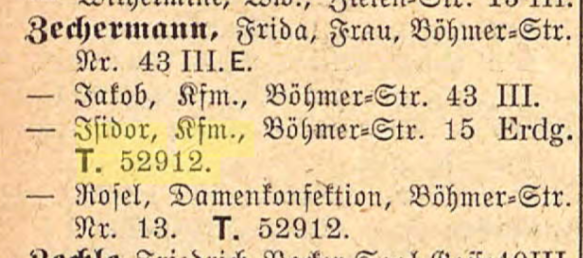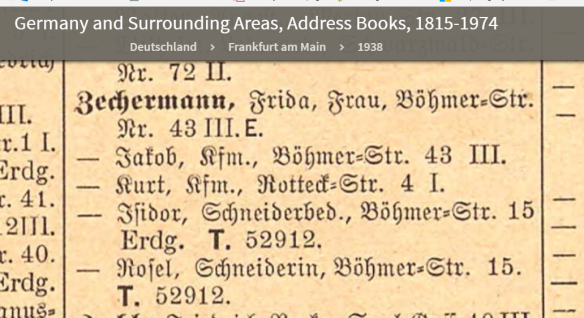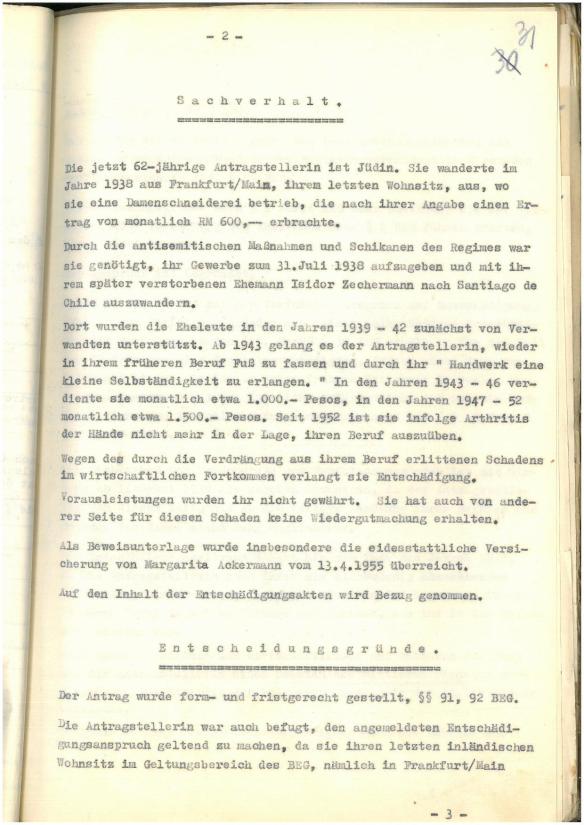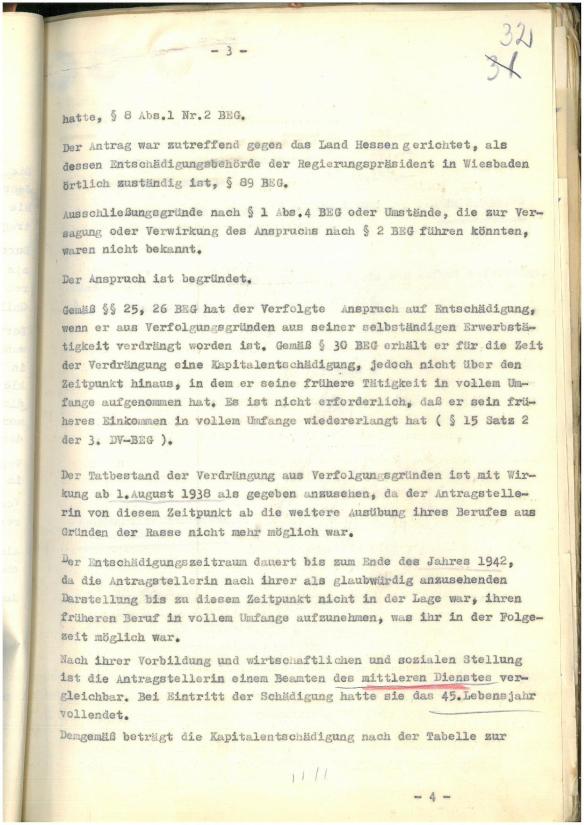Happy Hanukkah! Today’s post is in many ways fitting for Hanukkah, the holiday that commemorates the survival of a small number of Jews, the Maccabees, against all odds and the rededication of the Temple in Jerusalem after their victory. It is a story thus about Jewish survival against persecution and the struggle for freedom and so in many ways is the story of Rosa Abraham Zechermann.
Back on October 31, 2017, I wrote about my search for Rosa Abraham, my third cousin, once removed, and the aunt of Fred and Martin Abrahams. Through the amazing connections I made on Facebook, I’d been able to establish that Rosa had married Isidor Zechermann and that both of them had immigrated to Santiago, Chile, to escape Nazi Germany in the 1930s. At the end of that post I mentioned that I was requesting a copy of their naturalization application and other files from the archives in Hesse, hoping to learn more about Rosa and Isidor, including when and where they had married.
I have now received the files, and unfortunately, I still do not have the answer to those last two questions, but the files I received did shed light on Rosa and Isidor and their lives before and during the Nazi era and have helped me narrow down the possible years and places where Rosa and Isidor married.
The file that was described as a naturalization file was actually Isidor and Rosa’s application for repatriation as German citizens. It was filed in 1952. From the notes at the bottom of this letter, we can see that they left Germany together as a married couple on December 13, 1938.
In his letter, Isidor wrote, “We have been living in Santiago de Chile since 1939, but we never applied for the Chilean citizenship because we could not give up the faith one day to become citizens of our German homeland again. Upon request, the local German Consulate confirmed to me that repatriation is possible, and I would be particularly grateful for fulfilling my request.”
After all that they must have experienced and lost during the Nazi era, Isidor and Rosa still considered Germany their homeland and wanted their status as German citizens restored.
The government granted their request, concluding that they were among those who were denied citizenship for political, racial, or religious reasons during the Nazi era:
Two years later, Rosa applied for reparations from the German government for damages she suffered during the Nazi era. I am very grateful to Irene Newhouse of the Jekkes group on Facebook for her generous help in translating Rosa’s letter and the government’s response.
Santa Rosa 160 Dep. E.
Vitae curriculum
I had, in Frankfurt/Main, a women’s couture boutique and in the years 1932 to 31 July 1938, earned 600 Marks monthly.
I had to give up my skilled trade, as we, as Jews were victimized by the chicanery of the Nazis and the Gestapo, and the latter forced us to emigrate with threats. Relatives supported us from 1939 to 1942, until I succeeded to wring out a small independence with my needlework.
From the year 1943 to 1946, I earned about 1000 pesos a month, from 1947 to 1952, about 1500 pesos per month.
Since 1952, I’m unable to work due to gout, and am supported by my relations in the USA.
Rosa then requested compensation for her emigration expenses and the loss of her business and of her other assets.
In response the government awarded her 2,830.20 Deutsche marks as reparation for the damages she had suffered.
According to this website, in 1955 there were 4.2 marks to a US dollar, meaning that the award to Rosa was worth in 1955 about $673. Allowing for inflation, $673 in 1955 would be worth about $6,100 today, according to this calculator. Somehow that doesn’t seem like a very generous award for someone who had been forced to emigrate and sacrifice her business and her home.
Although I did not learn exactly when Rosa married Isidor, it is clear from these papers that they were married before they left Germany and had been living together in Frankfurt at the time of their emigration from Germany. Also, now that I know that Rosa had a business as a “Damenschneider” in Frankfurt beginning in 1932, I can assume that this is her listing in the 1932 Frankfurt directory:
That means she was married to Isidor as of 1932, probably earlier if she is listed this way in the 1932 directory. But where and when were they married?
Since Isidor’s first wife died on August 23, 1924, Isidor and Rosa must have married between then and 1932. Searching the Frankfurt directories before 1932, I found that Rosa was listed in the 1928 and 1931 directories as Rosa Abraham, not Zechermann, meaning that she must have married Isidor sometime between 1930 and 1932.
I have written to the registry in Frankfurt to see if they can find a marriage record, but it is also possible that Rosa was married in her birthplace, Niederurff. At any rate, I have narrowed down the possible range of years when they must have married.
Beginning in 1933 Isidor and Rosa are listed together, first living on Oberlindau Strasse and then beginning in 1935 at 15 Bohmerstrasse, the address given on their application for repatriation in 1952. Rosa (listed as Rosel) had her shop at 13 Bohmerstrasse. Living down the street were Jakob and Frida Zechermann, who presumably were Isidor’s relatives. Frida was named as Rosa’s representative in her request for reparations. Jakob and Isidor are both identified as “Kaufman,” or merchant. The Erdg indicates that Isidor and Rosa were living on the ground floor, and the T followed by a series of numbers was their telephone number.

1935 Frankfurt directory
Ancestry.com. Germany and Surrounding Areas, Address Books, 1815-1974 [database on-line]

In 1939 there is no separate listing for Rosa, just for Isidor. I assume by that time Rosa had been forced to close her business. And in 1940, neither Isidor nor Rosa is listed, of course, as they had departed for Chile.
Although I am still hoping to find a marriage record for Isidor and Rosa, I am now more satisfied that I have been able to put together a fuller picture of the life of my cousin Rosa Abraham Zechermann. And from Simon in the Jekkes group, I learned that Rosa and Isidor were an active part of the Jewish community in Santiago. They had struggled and they had survived to enjoy their freedom.
Thank you again to Irene Newhouse for translating Rosa’s reparations papers and also to the members of the German Genealogy group on Facebook for helping me decipher some of the abbreviations in the Frankfurt directories.
And happy Hanukkah to all!











Happy Hanukkah!
Nice use of the German directories to pinpoint the range for Rosa and Isidor’s marriage. I hope your queries turn up an answer to this question.
LikeLiked by 1 person
Thanks, Cathy! I haven’t yet gotten any response from Frankfurt, but will update if I do.
LikeLiked by 1 person
Are you keeping a log of the queries you send out?
LikeLiked by 1 person
No, not really. Just in my Sent email. And in my increasingly cluttered and dysfunctional brain. I can’t seem to function that way. 😦
LikeLiked by 1 person
I was wondering how you manage to keep up with what is pending. You seem to have a great success rate so I guess there aren’t that many unanswered.
LikeLiked by 1 person
There are many inquiries that do not ever get answered, but I’ve found that going back over my Sent Email works pretty well as a tickler. It’s not a perfect system, but I have tried to make this avocation one that doesn’t create too much stress, and if I had to keep logs, it would be stressful for me. I once tried to create a research log and found I was spending too much time doing paperwork, and it was distracting me from doing what I love—the actual research.
LikeLiked by 1 person
A true research log doesn’t work for me either. I leave notes and questions for myself in my database in the notes section (others can see these in my online GEDCOM and sometimes will answer them via email). Email is a challenge and my system isn’t perfect either.
LikeLiked by 1 person
I think everyone has to develop the method that works best for them. I suppose that if I were a professional genealogist being paid to research for others, I’d have to come up with a more comprehensive and structured way of keeping records. But for my purposes, this seems to be sufficient—so far!
LikeLiked by 1 person
Happy Hanukkah to you, too, Amy. You are a great sleuther and story writer.
LikeLiked by 2 people
Thank you, Linda! And thanks for always being so supportive of my efforts.
LikeLike
Happy Hanukkah, Amy. Like you, I thought the reparation was rather small for the trauma suffered. I was also so touched that they could trust enough to want to return to Germany. I’m not sure I would have that in me.
LikeLiked by 2 people
Thanks, Leslie! I don’t know whether they ever in fact returned to Germany—certainly they did not return there to live. But they obviously wanted to have the rights of being German citizens again.
LikeLiked by 1 person
Happy Hanukkah Amy.
LikeLiked by 1 person
Thank you, Su!
LikeLiked by 1 person
To you and your family, Amy, Happy Chanukkah!
LikeLiked by 1 person
Thanks, GP!
LikeLiked by 1 person
Kaufman means merchant–I didn’t know that! So interesting how you narrowed it down. I loved her letter. It’s been a long time since I’ve heard the word chicanery. Great word in this context, except there are others I would add to it . . . .
Happy Hanukkah to you and yours, Amy! xo
LikeLiked by 1 person
P.S. I love your cover photo.
LikeLiked by 1 person
Yes, Chicanery is definitely too mild a word. I wonder if it has a stronger meaning in German. I should like that up.
Happy Hanukkah to you and your family, Luanne! xo
LikeLike
I am so impressed that you can read that German script to even come up with a name. It’s nearly impossible for me even when you pointed out what I’m looking at.
LikeLiked by 1 person
I’ve gotten better at it when the writing is halfway legible, but reading Isidor’s father’s name was a challenge even for the experts who were trying to help me!
LikeLike
Pingback: Rosa Abraham and Isidor Zechermann: A Final Update | Brotmanblog: A Family Journey